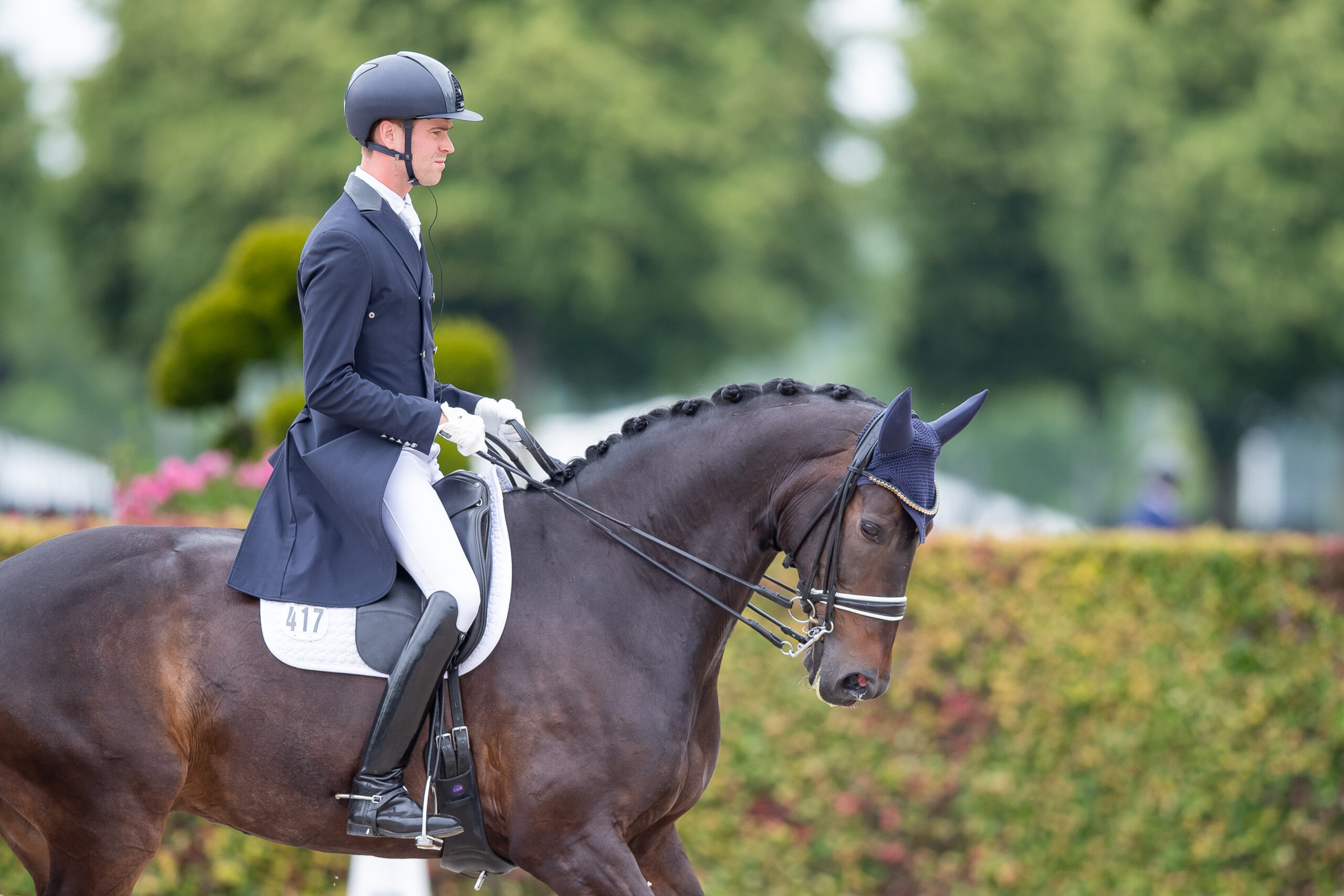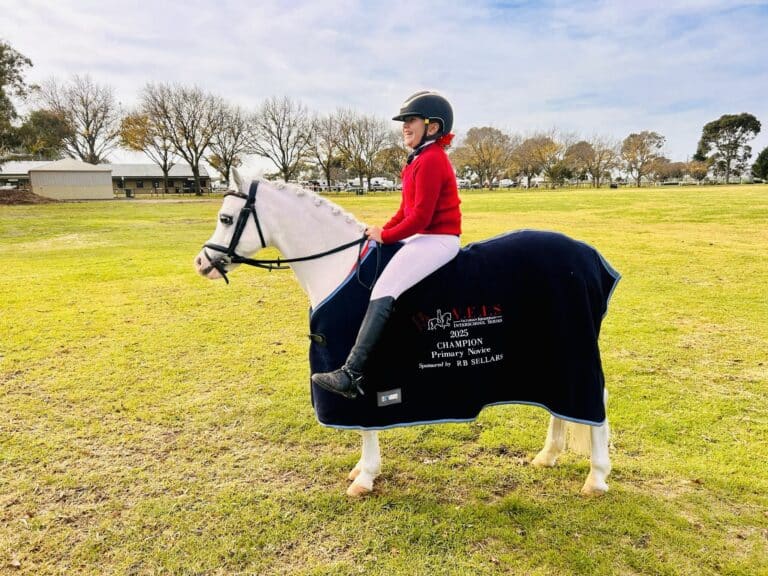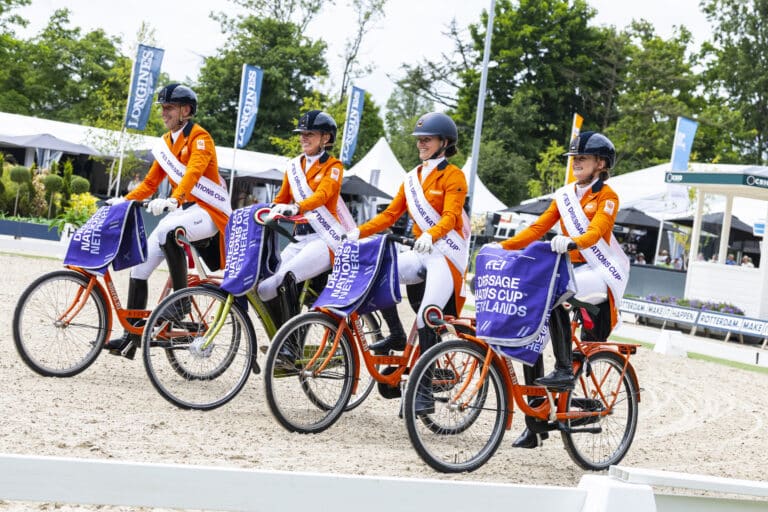By Roger Fitzhardinge
Image by Boots & Hooves Photography
If the warm-up is where a class is won or lost, you are halfway there if you can keep the competition warm-up routine the same as you do at home.
With years of training successfully completed, it now comes down to replicating the best work that you do at home in the competition arena. The variables for each horse and rider combination are infinite, and every rider’s mental state on the day, and how competition stress affects them, must be taken into account. The horse is the No.1 priority here, because a calm and logical horse that presents as it does at home will make every rider react in a more positive way. To get your horse to be as it is at home takes careful consideration.
Remember to keep your horse happy and not overloaded with new work leading up to the competition. Image: Roger Fitzhardinge,
The most important thing about any warm-up for a competition is that it begins at least a week out. Every day for a week before should be your warm-up. Here are a few things to consider – and this is for your horse’s first competition.
• Keep the work normal and avoid pre-competition anxiety where you think you suddenly need to make the work so much better because you must win! It’s good to keep it simple, as easy exercises won’t pressure him in the week before a big competition.
• Do not increase feed just because because you think he needs to be fatter. With some horses it’s better to taper the energy food and give ample hay towards the competition. On the other hand, if it’s a very seasoned horse and you know the show will be taxing, then it may be necessary to increase the energy food a little.
• Try to have a basic daily warm-up routine before you start serious work so your horse is very familiar with it, and at the competition it’s the same: normal and familiar.
• Make certain you have travelled your horse to venues before and are familiar with his reaction to travelling. Does he get hot and won’t need rugs? What side of the float is better for him? Does he tie up to the float? Is he easily spooked? (in which case, arrive with plenty of time to familiarise, whether by leading him around the arenas, lunging or riding him).
• Arrive with plenty of time and park in a quiet area with good footing and shade. If stables are available and that appeals, take them; or is he calmer left on the float with water and feed and regular walks? These factors need to be known before competition day. If the option of being there a day ahead is there to familiarise yourselves, you will be better equipped for the competition.
• Try not to change the routine leading in to the show and always make sure that you as the rider are well prepared and there’s nothing to organise at the last minute.
• The day before, if you have a familiarisation session, keep the work appropriate to your horse’s attitude. Spooky and worried? Take time to show him and let him sort it out in his own time. Too much energy needs addressing with perhaps a couple of rides and a wash and a break in between. A walk in-hand and a pick of grass always help. It is knowing your horse and what works best for him. If you are at home keep the work normal. Do not give him an easy day but make sure you end the session in a relaxed and well-worked way.
To lead your horse around to show him the areas is a good way to familiarise stress free. Image: Roger Fitzhardinge.
• Be prepared for competition day. Know the tests and the arena you are in, your times and your warm-up area. As a habit, carry your registration papers, whether needed or not, your height certificate and membership card. And remember there may be swabbing and you need to be confident you haven’t ignored withholding times for additives and the like.
Make certain you know the tests and the arena and you have all the paperwork required! Image: Roger Fitzhardinge.
Being so well prepared will give you confidence because you have all areas covered. The more you compete and train, and the more familiarisation and protocol days you get under your belt, the better, as competence leads to confidence.
At the competition it is really helpful to have a good friend or mentor to help you get ready and travel with you. It must be someone you have confidence in and who will pay attention solely to you and your horse’s needs; someone who is calm and methodical and not one to go off chatting when there is work to be done. If you are calm and happy, and have a friend and helper on your side, it is amazing the difference it makes.
It’s so good to have someone confident and competent to help you at the competition. Image: Roger Fitzhardinge.
You will have a good idea about the warm-up procedure that fits your horse’s attitude before you get to the competition. This will also depend on variables such as the atmosphere, spookiness of the venue, scary bunting and banners etc., and the event you are warming up for, whether it be a prelim test, hack class or grand prix, eventing or jumping. The warm-up will vary a little in time and type from event to event depending on the variables of each show.
Perhaps a lunge before you get on, if it’s applicable and you are confident that this is good – and never without the aid of rein to help control the frame. If you are at a dressage competition there are rules that must be adhered to and that you can’t get someone else to ride your horse unless it is at walk only and on a long rein. As for chambons and running reins (triangle and side reins are allowable only in a snaffle bridle) for lunging or riding, they are not allowed. So, if you feel your horse needs a lunge then do it in the designated area, not around the trucks where you will upset others.
A lunge is always helpful with the young ones. Image: Roger Fitzhardinge.
When you get on, be sure to have plenty of time and remember the first priority is to get a relaxed horse that’s able to think about the work. If it’s a dressage test or the like, it’s always good to start with your horse stretching, and open and long with a downward-thinking neck shape. If your horse is still worried and a little tense then sometimes it’s best not to walk but get into trot and on the bit and put them to work. When you give your horse a job to do, just as with people, then your mind has something positive to do and creates a sense of relaxation.
Who to have in the warm-up areas to help you? This is an important role, which varies from rider to rider. Their influence is incredible, but can be detrimental if attitudes clash. It is of the utmost importance not to get just anyone who rides. You need a person who knows your mind as much as your ability to ride. A coach you are training with is best, as they will know you and your horse, how to defuse problems and what to focus on. The warm-up can be where a class is won or lost. The warm-up with young horses is all about gaining confidence and making the experience positive for the future with not a thought about winning.
Crucial to a warm-up is to treat it as simply another day and the same as at home. The art of riding and competing in dressage has a very different to any other sport, such as athletics, swimming, football or any kind of racing where there is an element of adrenalin and to go as hard as you can. In riding a horse at a competition, you can’t suddenly be trying harder, use stronger aids or more pressure, as this will only make your horse tense and confused. It is not only about the rider and their awareness and stresses, the horse needs to connect with the rider and gain confidence to perform. The rider has to absolutely focus on riding, and with the same strength of aids as at home; even with less strength and more tact as your horse may be more sensitive than at home, being excited to be out. This is often a good thing but usually misinterpreted by a rider as resistance, and that’s where it all turns into a jumbled mess. It is important that you get positive reinforcement from your eyes on the ground to direct you to normality in times of tension and trouble. Good eyes on the ground help gain confidence and positivity. Good eyes keep a lid on volatile situations or, on the other hand, create more positivity in a rider who is lacking direction. Warm-ups are variable, of course, but for a horse it’s good to keep a warm-up the same as at home. Routine is easily understood. Your eyes on the ground should be aware of this and stick to it as it will make rider and horse feel at ease. Once the warm-up has progressed to a relaxed and willing partnership, then do the exercises.
Relaxed and easy warm ups are of the utmost importance in developing confidence. Image: Roger Fitzhardinge.
Always ride the lines and transitions that are in the test, and as they should be done in the test (e.g. shoulder-in from marker to marker as in the test… half pirouettes not full, if that is in the test… counter-canter where it is in the test). Practice the lines that you know are in the test so that when you get in there, you and the horse have no surprises. Make a mental list of the movements that are needed and tick them off (don’t forget the rein-back and the walk pirouettes). If there are movements that you know will create drama, stay away as the warm-up isn’t the time to make a fuss. Especially with changes – if they are okay and create anticipation, make simple changes rather than flying changes and create an accepting, non-anticipation warm-up. Of course, some horses become unresponsive to the aids if they are worried. You need to make very brisk and purposeful upward transitions and do exercises that are a little surprising to simply bring their attention back to the rider and the aids.
The build-up of the warm-up is to get your horse mentally prepared, supple and obedient as you have him at home, no more and no less. Of course, as the warm-up progresses so do the frame and the amount of collection and extension, until it is in the way that you’re training at home for the competition. The end of the warm-up should see your horse up and going but not over the top. Less is probably more, and remember, no clashing aids and don’t get strong and try too hard.
Always stay relaxed and often less is more. Image: Roger Fitzhardinge.
Finally, make sure you are not hurrying at the end to get into the ring. Allow ample time to get bandages etc. off and coat on and get to the final warm-up with plenty of time, then proceed in a purposeful way in your competition frame and the way that you want your horse to be in the test. No matter what the outcome of the test, it is all a learning experience and the test will only be a reflection of the work and effort you have put in. Learn by your warm-up and every test will give you positive input as to what needs to be worked on. Never show disappointment, as there is nothing you can do but train harder and get better.
READ THE LATEST NEWS ARTICLES HERE








